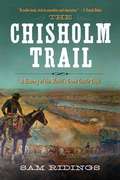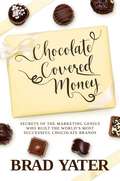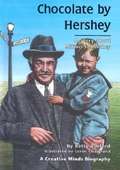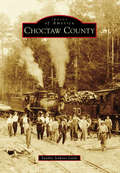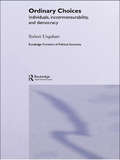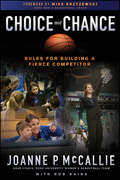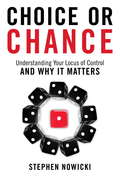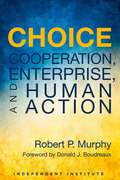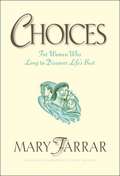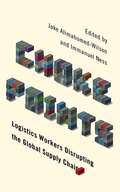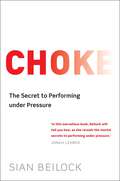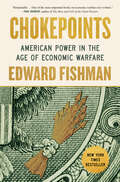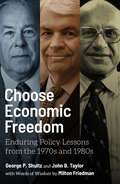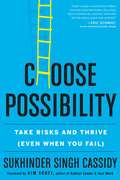- Table View
- List View
Chirurgie hat Zukunft: Innovative Aus- und Weiterbildung als Erfolgsfaktor (essentials)
by Wolfgang HellmannDie Nachfrage zum Praktischen Jahr (PJ) und zur Ärztlichen Weiterbildung in der Chirurgie lässt nach. Gegensteuerung ist erforderlich, attraktive Aus- und Weiterbildungsbedingungen sind zu schaffen. Das essential stellt dazu ausgewählte Strategien vor. Vorschläge zur Positionierung des Chefarztes als Anziehungspunkt mit Magnetwirkung und Tipps zur Optimierung der Öffentlichkeitsarbeit der Chirurgie runden die Inhalte ab.
Chisholm Trail: A History of the World's Greatest Cattle Trail
by Sam RidingsThis frontier classic is one of the best books written about the world’s greatest cattle trail, the Chisholm Trail, a trail that was approximately eight hundred miles long, running from San Antonio, Texas to Abilene, Kansas. It is a comprehensive book about the cattle drives of our western frontier and the interesting characters associated with them. Such characters include Charles Goodnight, Charles A. Siringo, Joseph G. McCoy and various Indian Chiefs and gunslingers. After the Civil War, many cattlemen saw that there was money to be made in moving cattle northward. Joseph G. McCoy built shipping pens at Abilene, which became known as the terminating point of the Chisholm Trail. When the trial was most active, millions of cattle and mustang accompanied their drivers on the two to three month journey that it took to travel across. This book is the story of those cattle and their drivers, who fought through Indian ambushes, stampedes and cattle rustlers. Skyhorse Publishing, as well as our Arcade imprint, are proud to publish a broad range of books for readers interested in history--books about World War II, the Third Reich, Hitler and his henchmen, the JFK assassination, conspiracies, the American Civil War, the American Revolution, gladiators, Vikings, ancient Rome, medieval times, the old West, and much more. While not every title we publish becomes a New York Times bestseller or a national bestseller, we are committed to books on subjects that are sometimes overlooked and to authors whose work might not otherwise find a home.
Chobani: Growing A Live and Active Culture (Abridged)
by Joshua D. Margolis Matthew PrebleHamdi Ulukaya, CEO of the Greek yogurt company Chobani, Inc., was reflecting on what explained his young company's meteoric rise. The company held over half of the U.S. Greek yogurt market and nearly 20% of the total yogurt market. The company's innovative approach to product design, sales, marketing, and communication had made its yogurt a hit with consumers, and its entrepreneurial and innovative culture made it popular with its employees. But by 2012, major food companies, such as General Mills and Groupe Danone, were beginning to aggressively promote their Greek yogurt. In addition, Chobani was rolling out innovative new products and had to determine how to enter new markets. At the same time, Ulukaya was also focused on preserving the company's unique culture and approach to work as it grew.
Chobani: Growing A Live and Active Culture (Abridged)
by Joshua D. Margolis Matthew PrebleHamdi Ulukaya, CEO of the Greek yogurt company Chobani, Inc., was reflecting on what explained his young company's meteoric rise. The company held over half of the U.S. Greek yogurt market, and nearly 20% of the total yogurt market. The company's innovative approach to product design, sales, marketing, and communication had made its yogurt a hit with consumers, and its entrepreneurial and innovative culture made it popular with its employees. But by 2012, major food companies, such as General Mills and Groupe Danone among others, were beginning to aggressively promote their Greek yogurt. In addition, Chobani was rolling out innovative new products, and had to determine how to enter new markets. At the same time, Ulukaya was also focused on preserving the company's unique culture and approach to work as it grew.
Chocolate Covered Money: Secrets of the Marketing Genius Who Built the World's Most Successful Chocolate Brands
by Brad YaterThe story of the man behind some of the world&’s biggest chocolate empires.Chocolate Covered Money is for anyone who eats chocolate, has shopped for chocolate as a gift, or has wondered what really goes on at the chocolate store &“in a mall near you.&” Chocolate is a big business, and makes a lot of money. This book &“pulls the curtain back&” for a behind-the-scenes look at the people who own chocolate companies, how they make chocolate, and their celebrity friends.This book reveals business methods used to enable three of the world&’s leading super-premium luxury Belgian chocolate brands—Godiva, Leonidas, and KC Chocolatier—to compete against one another, how each achieves marketing dominance in certain markets, and what it really takes to build a worldwide chain of retail stores.Brad Yater shares his business expertise, having served as country manager for the US at all three of these brands, beginning with Godiva, during a career lasting thirty years. Read the fascinating story of how this happened to him.
Chocolate by Hershey: A Story about Milton S. Hershey
by Betty BurfordA biographical account of the life of Milton Hershey who started the Hershey Chocolate Company and founded the Hershey Industrial School for children.
Chocolates El Rey
by Gustavo A. Herrero Rohit Deshpande Regina Garcia CuellarIn late November 2006, Jorge Redmond, CEO of Chocolates El Rey, called a meeting with senior management to discuss the company's growth strategy. A relatively small firm with sales of around $14 million, El Rey produced top quality chocolate made with single origin Venezuelan cocoa beans. The firm sold its chocolates in four different segments--food services, industry, retail and beverages--and exported 17% of its production, mostly to the United States, Europe, and Japan. El Rey needed to grow, but Redmond wondered how to achieve growth and how to market the "El Rey" brand to its different target segments and international markets. With only 0.5% of the cocoa's world production, was it worth the effort to try and establish a country-of-origin image for Venezuelan chocolate? If so, how could El Rey go about it?
Choctaw County (Images of America)
by Sandra Jenkins LittleChoctaw County, one of Alabama�s largest counties by area at 909 square miles, is one of the smallest in population. It was established on December 29, 1847, by taking land from Sumter and Washington Counties. The county seat was named Butler after Col. Pierce Mason Butler, who had been killed several months earlier during the Battle of Churubusco. Today, Choctaw County is a recognized leader in the pulpwood industry and renowned for its hunting and fishing. Cattle farming and agriculture also play a large role in daily life and economics. Residents take pride in having the first producing oil well in the state of Alabama, the remains of the historic healing waters of the Bladon Springs Hotel, and even a connection with the basilosaurus cetoides, a prehistoric sea mammal found near Melvin, currently on display in the Smithsonian National Museum of Natural History.
Choice Hotels International--1995
by Tarun Khanna Israel GanotIllustrates the various ways in which Choice Hotels, the franchiser for seven mid-market hotel chains, can realize economies of scope across its multiple products. Also provides an opportunity to discuss the benefits and limitations of various organizational forms (particularly, the franchise form) as a means of realizing these economies of scope. In adapting to a maturing U.S. hotel market, Choice has to confront the realization that the competitive environment and its choice of organizational form impose restrictions on the ways in which it can realize these economies of scope.
Choice in Everyday Life: Individuals, Incommensurability and Democracy (Routledge Frontiers of Political Economy)
by Robert UrquhartSocial choice and decision-making are key topics in economic theory and Robert Urquhart delves into the world of philosophy in this superb new book.
Choice not Chance
by Joanne P. Mccallie Rob RainsForeword by Mike Krzyzewski, Duke's Men Basketball Coach A celebrated coach reveals the secrets to building a fierce competitor At age 26, Joanne P. McCallie, a. k. a. Coach P, began her career at Maine, where in the span of eight years, she elevated the women's basketball program to a very competitive team that outdrew the men's crowds, a rarity in college sports. Over her tenure, she created the Choice Not Chance (CNC) philosophy, training kids how to think and focus on making the correct choices in life. She imparted her passionate philosophy to all of her players and now brings it to her efforts as head coach at Duke. Choice Not Chancehighlights McCallie's lessons for building a fierce competitor, such as "Going against the grain," "Never become satisfied," and "Enjoy the prospect of getting better daily. " The CNC philosophy is widely used by McCallie, her staff, and players, who are very active in the community speaking about "CNC. " Joanne P. McCallie is head coach of the Duke Women's Basketball team and was the ACC Coach of the Year in 2010 McCallie became the first coach in Division I history to be crowned champion in four different conferences, as well as the first coach in NCAA history to garner coach of the year accolades in four different leagues A native of Brunswick, Maine, McCallie owns a career mark of 431-174 and is entering her 20th year as a head coach at Maine, Michigan State and Duke; as a coach and player, she has led her teams to 15 conference titles, 19 NCAA Tournament appearances, seven NCAA Sweet 16 appearances, five NCAA Elite Eight appearances, three NCAA Final Four appearances and three NCAA Championship game appearances During the 2004-05 season at Michigan State, she won the Big Ten Regular Season and Tournament Championship en route to a National Championship game appearance. For her efforts she was named the Associated Press National Coach of the Year McCallie has taught her teams to play with passion and fight hard for recognition, and her teams have achieved remarkable success. Apply her wisdom to your teams, your employees, and your own life.
Choice or Chance
by Stephen NowickiHow Much Do You Believe That What Happens to You Is the Result of Your Own Actions--or Do Circumstances Beyond Your Control Largely Determine Your Fate?Locus of Control (LOC) is a phrase used by psychologists to describe a widely effective way of assessing an individual's potential for success--personal, social, and financial. LOC measures how much you believe what happens to you is the result of your own actions or, conversely, of forces and circumstances beyond your control. People who accept that they are largely in control of their lives tend to do better than those who feel that fate or external factors rule what they do, especially in novel and difficult situations.This book explains LOC research, until now mainly confined to academic circles, in terms easily understandable to the average person. The author, a clinical psychologist who has spent nearly five decades investigating and writing about LOC, helps the reader to explore his or her own locus of control and what those orientations might mean for how life is lived. He discusses the extensively documented relationship between LOC and academic achievement, personal and social adjustment, health, and financial success. Dr. Nowicki notes that there has been an increasing tendency among Americans to feel as though their lives are slipping out of their control, and he identifies ways to reverse this negative trend.He describes how the Locus of Control is learned and demonstrates ways in which it can be changed to yield higher levels of achievement, success, personal satisfaction, and better interactions with others.From the Trade Paperback edition.
Choice, Preferences, and Procedures
by Kotaro SuzumuraSocial choice theory critically assesses and rationally designs economic mechanisms for improving human well-being. Kotaro Suzumura--one of the world's foremost thinkers in social choice theory and welfare economics--fuses abstract ideas with real-world economies to examine foundational issues of normative economics and collective decision making.
Choice: Cooperation, Enterprise, and Human Action
by Robert P. Murphy Donald J. BoudreauxUnlike what usually passes for economics in many classrooms, government, the media and elsewhere, Choice is an engaging and intriguing book that provides something quite unique: a genuine treatise on economics that instructs and entertains both economists and general readers.Drawing on the seminal volume by the &“Austrian School&” economist Ludwig von Mises, Human Action, and comparing classical and neoclassical approaches, Choice is a creative, comprehensive, and unusually lucid book on economic science and market processes. The book illuminates free economies as underpinning civilization, the folly of government central planning, the primacy of entrepreneurship and innovation, the nature of money and banking, the causes of the business cycle, the failures of government intervention, and more. As a result, Choice teaches economic principles and exposes economic fallacies, and any reader will learn both the important truths about economics and the crucial value of individual choice, entrepreneurship, and free markets.
Choice: UBU (You Be You)--How Choice Operates in Consumer and Political Marketplaces
by John A. Quelch Katherine A. JoczChoice is an integral part of life - linking with desire, identity, power, and rationality. It also comes with burdens, sometimes becoming too much of a good thing for both consumers and marketers. The dynamism of market economies has worked so well that consumers must choose among a relentlessly expanding number of options. In contrast, the political marketplace offers a relatively limited range of options, and citizens may or may not obtain outcomes that accord with their preferences. Nevertheless, choice is essential to representative democracies.
Choices, Conflict, and the Creative Spark: The Probelm-Solving Power of Integrative Thinking
by Roger L. MartinThis chapter describes the process of integrative thinking, providing examples from the world of business and beyond, to illustrate the capacities and skills that people must develop to practice integrative thinking.
Choices, Values, and Frames
by Daniel Kahneman Amos TverskyThis book presents the definitive exposition of 'prospect theory', a compelling alternative to the classical utility theory of choice. Building on the 1982 volume, Judgement Under Uncertainty, this book brings together seminal papers on prospect theory from economists, decision theorists, and psychologists, including the work of the late Amos Tversky, whose contributions are collected here for the first time. While remaining within a rational choice framework, prospect theory delivers more accurate, empirically verified predictions in key test cases, as well as helping to explain many complex, real-world puzzles. In this volume, it is brought to bear on phenomena as diverse as the principles of legal compensation, the equity premium puzzle in financial markets, and the number of hours that New York cab drivers choose to drive on rainy days. Theoretically elegant and empirically robust, this volume shows how prospect theory has matured into a new science of decision making.
Choices: For Women Who Long to Discover Life's Best
by Mary FarrarToday Women have many choices. This book of 12 lessons prepares women to make wise, God-aligned decisions in such vital areas as career, family, and personal growth. Each lesson has its own group study guide.From the Trade Paperback edition.
Choke Points: Logistics Workers Disrupting the Global Supply Chain (Wildcat)
by Immanuel Ness Jake Alimahomed-WilsonGlobal capitalism is a precarious system. Relying on the steady flow of goods across the world, trans-national companies such as Wal-Mart and Amazon depend on the work of millions in docks, warehouses and logistics centers to keep their goods moving. <p><p>This is the global supply chain, and, if the chain is broken, capitalism grinds to a halt. This book looks at case studies across the world to uncover a network of resistance by these workers who, despite their importance, often face vast exploitation and economic violence. <p><p>Experiencing first hand wildcat strikes, organized blockades and boycotts, the authors explore a diverse range of case studies, from South China dockworkers to the transformation of the port of Piraeus in Greece, and from the Southern California logistics sector, to dock and logistical workers in Chile and unions in Turkey.
Choke: The Secret To Performing Under Pressure
by Sian BeilockIn the tradition of Steven Pinker's How the Mind Works, popular psychologist Sian Beilock, an expert on performance and brain science, reveals the astonishing new science of why we choke under pressure. She explains what happens in the body and mind when everything clicks and the perfect golf swing, tricky mathematical problem, or high-pressure business pitch suddenly become easy.With surprising insights on every page, Beilock examines how: attention and working memory guide human performance; how experience and practice, innate factors, and brain development interact to create our abilities;how these interconnected elements react to stress - explaining counterintuitive realities, like why the cleverest students do worst on standardized tests; why we may learn foreign languages best when we're not paying attention; why early childhood athletic training can backfire; and how our emotions can make us both smarter and dumber.the mind and body are in even closer communication than was ever thought - and breaks new ground on top of 30 years of integrative health investigations.
Chokepoints: American Power in the Age of Economic Warfare
by Edward FishmanAN INSTANT NEW YORK TIMES BESTSELLER <p> "Deftly written, Chokepoints is a compelling and dramatic narrative about the new shape of geopolitics."— Daniel Yergin, The Wall Street Journal. <p> “Remarkable ... One of the most important books on economic warfare ever written.” — Paul Kennedy, author of The Rise and Fall of the Great Powers. <p> The epic story of how America turned the world economy into a weapon, upending decades of globalization to take on a new authoritarian axis—Russia, China, and Iran. It used to be that ravaging another country’s economy required blockading its ports and laying siege to its cities. Now all it takes is a statement posted online by the U.S. government. <p> In Chokepoints, Edward Fishman, a former top State Department sanctions official, takes us deep into the back rooms of power to reveal the untold history of the last two decades of U.S. foreign policy, in which America renounced the gospel of globalization and waged a new kind of economic war. As Vladimir Putin, Xi Jinping, and Ayatollah Khamenei wreaked havoc on the world stage, mavericks within the U.S. government built a fearsome new arsenal of economic weapons, exploiting America’s dominance in global finance and technology. Successive U.S. presidents have relied on these unconventional weapons to address the most pressing national-security threats, for good and for ill. <p> Chokepoints provides a thrilling account of one of the most critical geopolitical developments of our time, demystifying the complex strategies the U.S. government uses to harness the power of Wall Street, Silicon Valley, and Big Oil against America’s enemies. At the center of the narrative is an eclectic group of policy innovators: the diplomats, lawyers, and financial whizzes who’ve masterminded America’s escalating economic wars against Russia, China, and Iran. Economic warfare has become the primary way the United States confronts international crises and counters rivals. Sometimes it has achieved spectacular success; other times, bitter failure. The result we live with today is a new world order: an economic arms race among great powers and a fracturing global economy. Chokepoints is the definitive account of how America pioneered this new, hard-hitting style of economic war—and how it’s changing the world. <b>New York Times Bestseller</b>
Choose Action: Systematic Ethical Decision Making
by Clinton D. Korver Ronald A. HowardA personal ethical code can often guide us to the right answer, but it may not guide us to the best answer. In challenging situations loaded with ethical issues, we can make smarter decisions by stopping long enough to follow a simple decision-making process that supplements our code-this chapter shows you how.
Choose Economic Freedom: Enduring Policy Lessons from the 1970s and 1980s
by John B. Taylor George P. ShultzWhat are the keys to good economic policy? George P. Shultz and John B. Taylor draw from their several decades of experience at the forefront of national economic policy making to show how market fundamentals beat politically popular government interventions—be they from Democrats or Republicans—as a recipe for success.Choose Economic Freedom reconstructs debates from the 1960s and 1970s about the use of wage and price controls as tools of policy, showing how brilliant economists can hold diametrically opposed views about the wisdom of using government intervention to spur the economy. Speeches and documents from the era include a recently unearthed memo from Arthur Burns, Federal Reserve chair, in 1971, in which he argues in favor of controls.Under Burns's guidance and in the face of stubborn inflation, Nixon introduced wage and price guidelines and freezes. But over the long run, these became a drag on the economy and ultimately failed. It wasn't until the Reagan administration that these controls were reversed, resulting in a vibrant economy.The words of iconic economist Milton Friedman—whose "free to choose" ethos inspired the free-market revolution of the Reagan era—along with lessons Shultz and Taylor learned from the front lines, demonstrate that tried-and-true economic policy works.
Choose Possibility: Take Risks and Thrive (Even When You Fail)
by Sukhinder Singh CassidyAn indispensable guide to decision-making and risk-taking for anyone who finds themselves afraid of making a wrong choice in their career. This fresh, new approach comes from one of the most highly regarded and well-respected female tech executives in Silicon Valley, who made many wrong choices in her career, but learned how to turn those down moments into successes. Life is made up of a series of choices. What do you do if one of those choices turns out poorly, especially if it was carefully considered? How do you trust your instinctive decision-making skills and make the next right choice? How do you continue to take risks when, suddenly, your risks are not working out? Sukhinder Singh Cassidy is one of the most highly regarded and well-respected female tech executives in Silicon Valley, but she&’ll be the first to admit that her path to success has been far from linear. She started three companies that have done exceedingly well, including theBoardlist (an organization designed to promote and place women onto corporate boards), and she just served as president of StubHub, which sold earlier this year for $4 billion. But she&’s also encountered plenty of poor choices, misfires, unexpected headwinds, and all other types of pitfalls that she had to learn how to confront, analyze, navigate, and incorporate into her new path forward. From her own experience, she knows that personal success does not come from making one singular &“correct&” or &“big&” decision. Rather, long-range success comes from tackling numerous choices that are aimed to optimize future possibilities. Singh Cassidy&’s &“seven myths of success,&” as well as her advice on how to make FOMO into your friend, multiply your &“bets&” in life, and understand why you shouldn&’t be blinded by &“passion bias,&” all provide an entirely new way to approach risk-taking and achieve lasting success.

